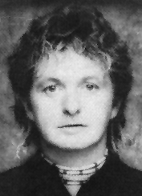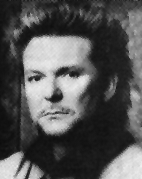![]()
| Anderson & Squire - In Their Own Words |
|
![]()
|
Jon Anderson and Chris Squire are different in personality and style, but they form the foundation of Yes, a band that was among the leaders of the new rock that emerged in the Seventies. |
![]()

![]() met Chris in 1968, in a drinking club in Soho called La Chasse. The very first thing we talked about was the production on Simon and Garfunkel albums and whether we could make a few musical statements on our own.
met Chris in 1968, in a drinking club in Soho called La Chasse. The very first thing we talked about was the production on Simon and Garfunkel albums and whether we could make a few musical statements on our own.
The first actual show Yes did, half the show was a rendition of "Midnight Hour," a groovy "Midnight Hour," slowed down. The organ player at the time, Tony Kaye, would do a Doors sort of thing, and the guitars would start doing feedback stuff. Not heavy, more quiet and groovy. In a way, we were doing Motown-type songs, slowing them down, reinterpreting them our own way.
|
Yes's Seventies Billboard Top 10 Albums Fragile 2/72 #3 Close To The Edge 11/72 #6 Tales From Topographic Oceans 3/74 #8 Relayer 1/75 #9 |
By the beginning of the Seventies, after Steve Howe and Rick Wakeman had joined, we were on our way to becoming a very strong unit. I was learning how to motivate. My whole part in Yes was to motivate. I never wanted to just stand there and look like a singer, probably because I was always unsure about being the singer.
But it was relatively easy to motivate the others because they were all willing. It was only after we became very successful that it became more difficult. It seems to just happen that way. We moved into larger territory. We started playing longer pieces of music, music with more dimension, stage visuals when we went out on tour. We were going onstage and doing "Close to the Edge," a twenty-minute piece, plus another three ten-minute pieces. This was a new thing, a sort of quantum leap for a rock'n'roll band to be performing a twenty-minute piece without a guitar solo. And there's no guitar solo in "Close to the Edge." It's a steady, structured piece of music.
I remember performing it in London for the first time. We were on a show with Elton John, and the twenty minutes seemed like two hours. We were so frightened of losing the audience, figuring they'd get bored and have to go out for a hot dog. How do you hold an audience without hitting them with a three-minute pop song? We didn't have a three-minute pop song, but we did hold them.
 |
"My whole part in Yes was to motivate. I never wanted to just stand there and look like a singer, probably because I was always unsure about being the singer." |
I suppose the fact that it was the early Seventies had a lot to do with it. FM radio was really beginning to flex its muscles. They would play albums all night long, music without stopping for a commercial. That was heaven for a band like ours. It allowed us to play "Close to the Edge" and not worry about it.
I'll never forget this one radio station in Paris. I think it was called PFI. They would play David Bowie, then Sinatra. Then Beethoven, then Yes, followed by Frank Zappa and Cleo Laine. It was one of the world's greatest radio stations. ![]()
![]()

![]() o one in my family was musical. When I was very young, I joined the local church choir because a friend of mine who lived on the block had a father who was a clarinet player, and they were a musical family, and the boy and I were the same age, seven or eight, and he let it be known he was joining the choir. So I joined, too. He was my mate, and I went along with him.
o one in my family was musical. When I was very young, I joined the local church choir because a friend of mine who lived on the block had a father who was a clarinet player, and they were a musical family, and the boy and I were the same age, seven or eight, and he let it be known he was joining the choir. So I joined, too. He was my mate, and I went along with him.
Amazingly, our little church choir then got a guy straight out of Cambridge University. This guy was destined for stardom in the English church system. As a matter of fact, he ended up at Charles and Di's wedding. But we got the guy when he was twenty-one and I was eight, and he made our little local church choir into the best choir in England. It was a great lesson for me.
|
Yes's Seventies Billboard Top 40 Singles "Your Move" 12/71 #40 "Roundabout" 3/72 #13 |
I couldn't play an instrument. I would just sing. And that's how I learned music, through English church music. In fact, our church choir was so good that we actually ended up doing gigs as a unit. We would go from church to church, which seemed ridiculous. Then we'd do radio shows. We even got paid for some radio shows, which was unheard of. But I never thought music would become a career for me.
|
Yes Lyrics Yes Videos |
And then, when I was fourteen, my voice changed, and I began going to regular school. Of course, I had all that musical knowledge, and I would tell the choirmaster at school everything -- which way to do things, how to arrange. He was always asking me because he knew I was one of the guys who had learned under that superstar from Cambridge. This was all very pleasant, but I still had no idea what I was going to be when I grew up. I wasn't thinking musician, or lawyer, or doctor. I had no idea at all.
Then at sixteen, which was in 1964, the Beatles were happening, and there I was, sixteen, and a friend of mine got a guitar and said, "Oh, Chris, you're tall. Why don't you get a bass guitar and become a bass player?"
And that was it. I did. I had big hands, which meant I could play bass. ![]()
![]() Reader's Comments
Reader's Comments
No comments so far, be the first to comment.
| Check out the |  |  |
